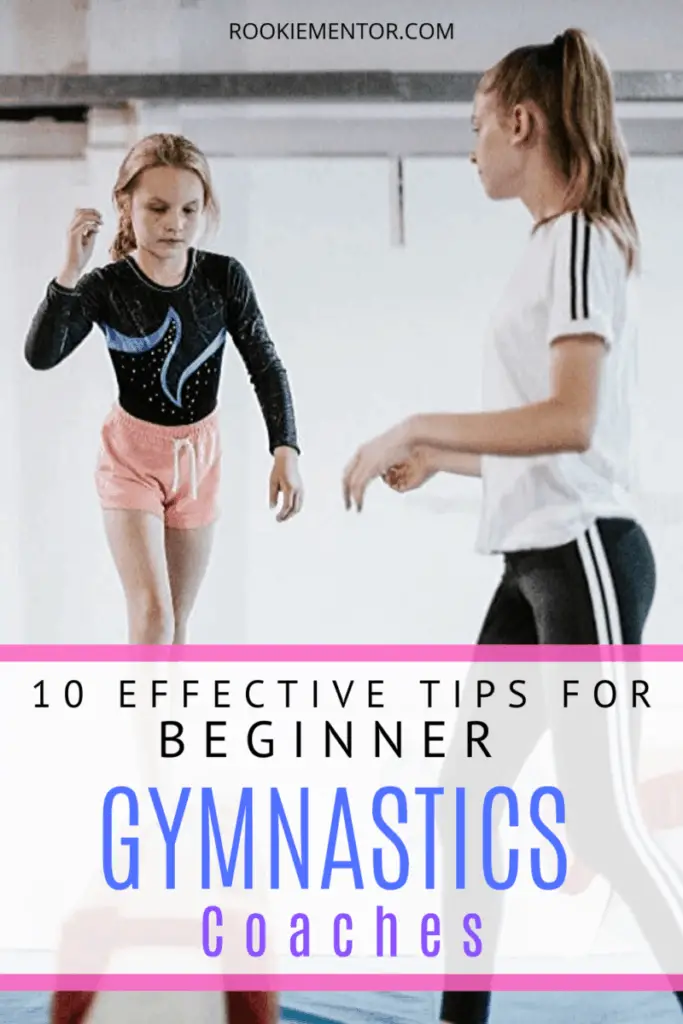Coaching a youth sport, such as gymnastics, can be a very rewarding experience. Leading a team to victory or helping an individual student overcome their fears and challenges is not only a fantastic accomplishment for your resume – but it feels pretty great too.
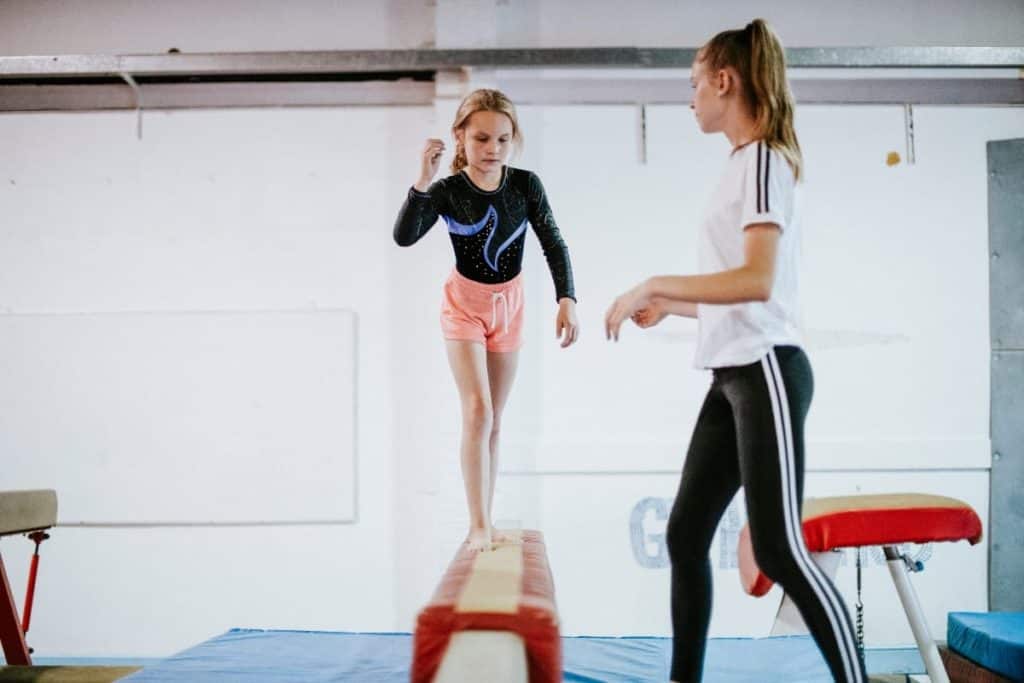
Coaching kids is also a great way to increase your own personal growth and development while helping others. But if you’re new to the coaching scene, you’re probably wondering where to start and exactly how to be the best you can be. So do read on for our top 10 tips for the new or beginner gymnastics coach.
1. Go At Each Child’s Pace
It’s important to adapt your practices and drills to each student’s individual ability. You will generally want to stay at each child’s pace – with a caveat. Knowing when to gently push a child and when they are ready for a bit more of a challenge is also an important part of successful coaching.
While you never want a child to feel discouraged or pressured – you don’t want to coddle them either. Most likely, part of the reason they are participating in a sport is to learn how to overcome challenges.
Some children are by nature reluctant learners and have yet to learn this valuable lesson. If you never push them; they will never learn. Others are very hard on themselves – and pushing them before they are ready will only cause them to feel frustrated and discouraged to the point of giving up.
Every child is different, and a good coach makes sure to pay attention to each child’s personality and ability to know how much they are capable of handling at any given time.
Related: 6 Ways Coaches Can Motivate and Excite Female Athletes
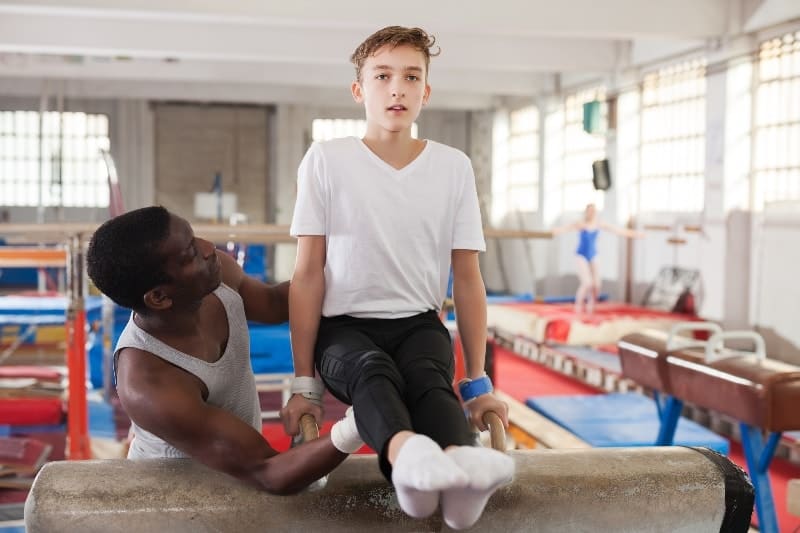
2. Celebrate Their Accomplishments
Everyone performs better when they feel their efforts are recognized and appreciated. Kids participating in youth sports are no exception.
When your student finally nails that back handspring, you definitely want to take a moment to acknowledge their small personal victory.
There are many ways to celebrate when a child reaches a milestone. You could pause as a team to clap and cheer, or set up a bell on the gym floor for students to ring when they master a new skill.
Incorporating a set of regular milestones for achievements also helps kids to learn how to set and reach goals.
There are many ways to accomplish this, but oftentimes a gym will create different levels or grades for all of their classes with a list of checkpoints for each one. The child would then receive a certificate when they pass each level. This also helps parents and other family members stay involved in their children’s progress.
3. Create A Positive Environment
When parents sign their kids up for an activity like gymnastics, they are most likely seeking a positive environment for their children to learn much more than just gymnastics skills. They are also hoping their child will learn valuable life skills such as teamwork, perseverance, the value of hard work and listening to their elders.
You want your class to be a place where each student leaves just a little bit better than when they came.
As the coach, your students look to you to set the tone for the team. Just like in business, team culture comes from the top down. So if you want a happy, successful and positive team – you have to exhibit those traits yourself. Your team is a reflection of you and the values that define you. Make sure they are positive ones.
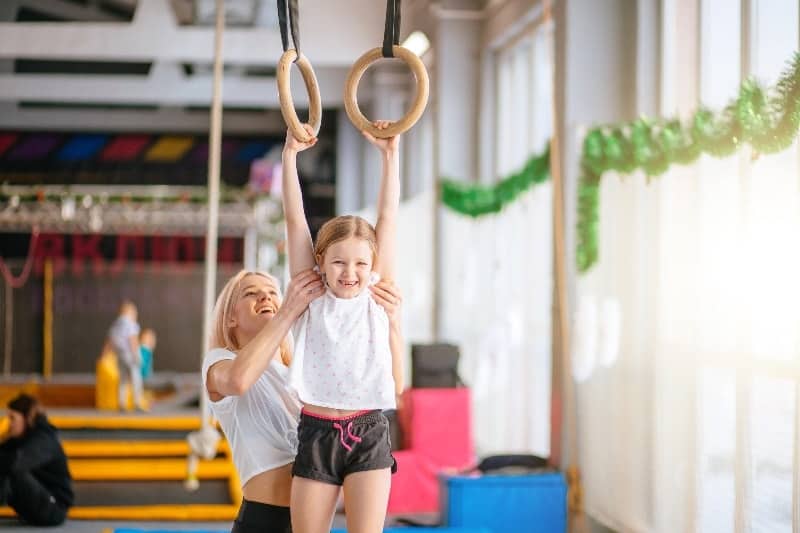
4. Be Prepared
Preparation instills confidence and confidence is key to successful leadership. The more prepared you are, the less likely you are to make mistakes, feel inadequate or waste valuable class time scrambling to find your groove.
Being prepared and exuding confidence will also help you earn the trust and respect of the students you have been entrusted with.
Prepare your lessons, drills and other group activities far in advance, and review your game plan just before each practice to refresh your memory.
5. Always Include Order & Structure to Your Gymnastics Classes
It is crucial to maintain control of your class at all times – especially when you are teaching younger students. Establishing a consistent routine will help the kids know what to expect and which behavior is expected of them at each time.
For example – you may wish to structure your class with stretching and a fun game at the beginning, some floor rotations in the middle, and some free-time to look forward to at the end. The promise of 5 minutes jumping on the trampolines or playing in the foam pit to wrap up the class can be a serious motivation to keep younger students focused and on task when you need them to be.
Learning a few ways to command the attention of your team or class quickly is key to running a successful group. Every teacher and coach has had the unfortunate experience of attempting to yell loud enough to be heard over an excited class or group of young kids. It doesn’t work very well.
Some attention-getting strategies that educators have found successful include special whistles, claps or chants that can be used as a call and response routine. These fun gimmicks not only get the kids’ attention in a positive way, but also require some sort of participation, redirecting their focus back to you.
[VIDEO] – Though basic, this video gives some great ideas for warming up your gymnastics class and having some fun.
6. Involve Parents
When your students have something they need to work on, including their parents in the process can be key to their continued success and skill mastery.
A simple chat after class or habit of email communication with your students’ parents can go a long way towards a successful coaching relationship. This communication should also help with student retention.
Related: Why Coaches Should Encourage Parents to Attend Sports Practice
When parents feel informed, they are more likely to be satisfied that their students are progressing and learning under your leadership. Parents want to know they aren’t throwing their hard-earned money away just for their child to goof around in class.
At the competition level, family involvement is especially key to helping a student feel supported, loved and encouraged.
Performance is directly impacted by consistent practice; and practice is directly impacted by parent participation.
7. Practice What You Preach
Little eyes are watching. Your students likely look up to you more than you know. Whether it’s demonstrating to the class a perfect dismount, or exhibiting good sportsmanship after a loss at a competition, your students are looking to you to show them how to be a successful gymnast.
There’s also something fun and lighthearted about a coach or teacher coming down to their level to connect with them by participating in the same types of activities they are. In other words – don’t just talk the talk. You’ve got to walk the walk to connect with today’s kids and teens.
Related: What Makes a Bad Youth Sports Coach? How to Not Become One
8. Don’t Forget To Have Fun
There’s a time and a place to get down to business, but don’t forget that you’ve got to have some fun too. This could be as simple as playing upbeat music during practice or adding some games to your warm-up and cool-down sessions.
Incorporating some fun and laughter into your lessons helps to keep students engaged, involved and learning.
Depending on what age and level of gymnastics you will be coaching, you may have a mix of serious students and those who are there just for fun. But even those students who wish to win gold medals and perfect their sport want to have a good time trying! 😉
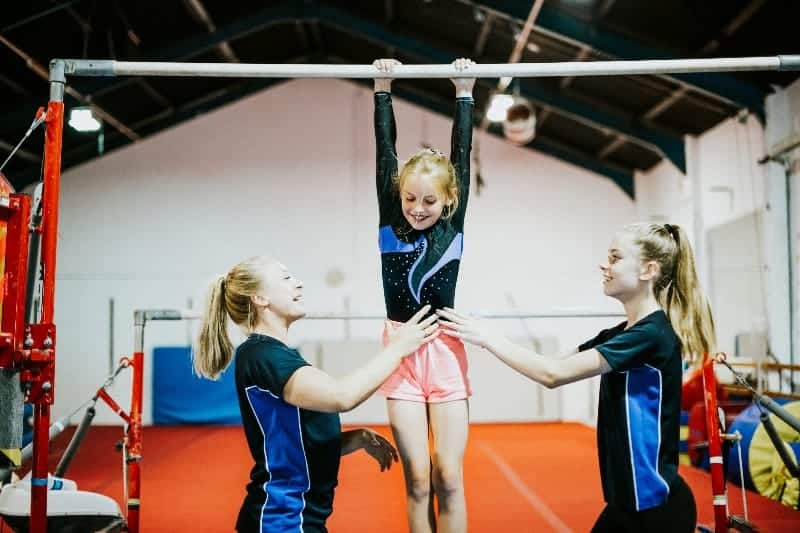
9. Practice Positive Discipline & Correction
No one wants to come to class to be yelled at all day. Keeping a cool head under pressure is key to running a successful class. The stress of a misbehaving group or an unruly student may threaten to unravel your team, but your attitude can make all the difference in getting things back on track.
Depending on the age of the student, you may need to practice some gentle disciplinary techniques such as sending a child to time out, or when all else fails – bringing in a parent.
This is one area where you will want to check with your gym to see how they would prefer you to handle these types of issues. Each gym likely has their own procedures and policies for student discipline, but staying positive is a good rule of thumb in any situation.
If you must give behavioral correction, remember to also reinforce positive behavior when you see it. This helps kids understand the rules and boundaries, and rise to the standard you have set for them.
Similarly, when you need to correct form or technique, remember that kids are more likely to respond to constructive criticism that is given in love. They can feel it when their elders are overly critical or impossible to please. Gently suggesting improvements and making sure to celebrate their wins will go a long way towards creating a motivated and successful student.
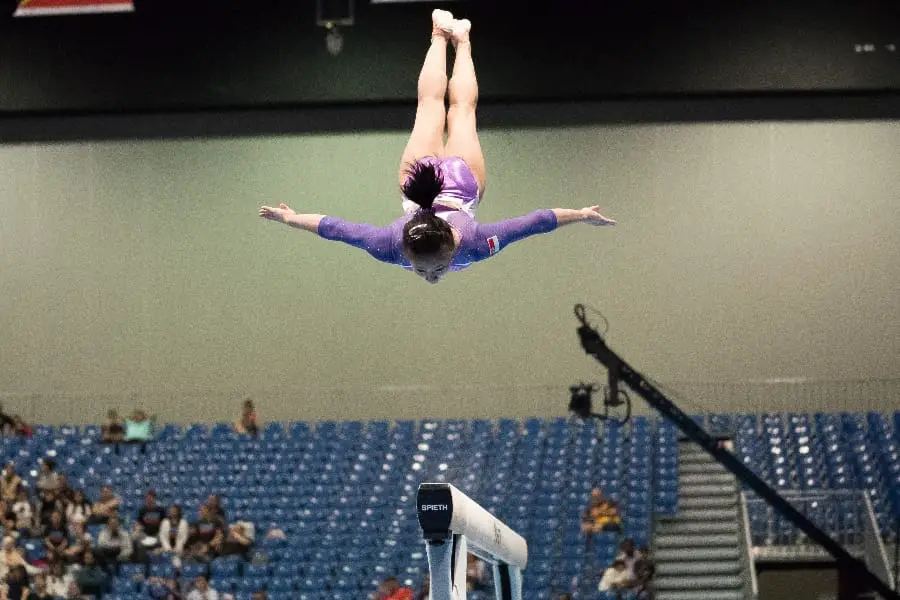
10. Remember Your “Why”
As with anything in life – when the long days of coaching get hard, it’s important to remember why you’re doing it. If you are passionate about your sport and are involved in it for the right reasons, your students will feel it.
Likewise, if you are just going through the motions, your students will feel that too. Children and teens of this generation value authenticity extremely high.
Passion is contagious. One of the best ways to keep your team motivated and on task is to create an environment that thrives on love for the sport. At the end of the day, it’s not so much WHAT you teach, but HOW and WHY you do it.
Related: When to Quit Coaching Sports?

Keep Reading:
- 6 Ways Coaches Can Motivate and Excite Female Athletes
- Building Confidence in Female Athletes: Keys To Coaching Girls
Summary: Top 10 Tips for Beginner Gymnastics Coaches
Successful coaching is about so much more than just teaching the proper techniques and skills. Students need to be valued, encouraged, motivated, supported and loved.
So what makes a successful coach?
The key is in your love for the sport, passion for seeing your students succeed, and willingness to grow right alongside your team.
Even though you might be learning the fundamentals of the sport still, remember our top 10 tips above and you will be on the right path to success as a new gymnastics coach!
Cheers,
Daniel

